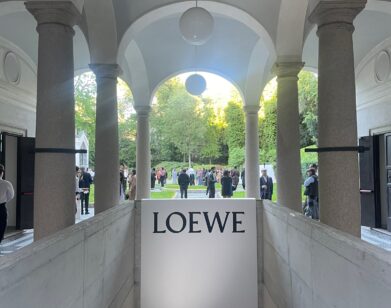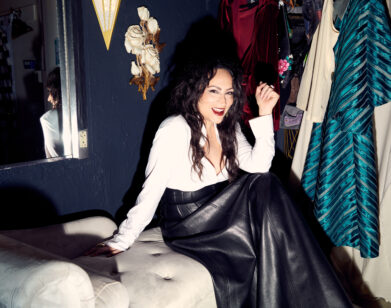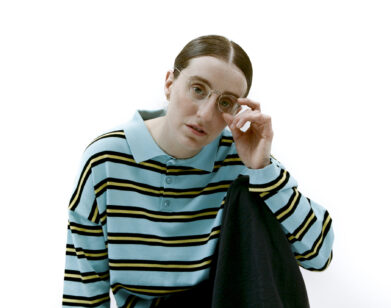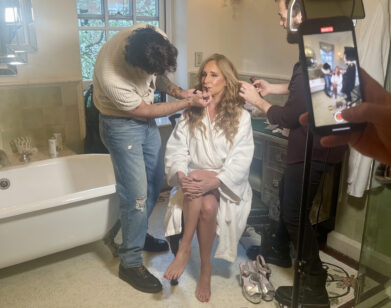John Ridley’s American Landscape
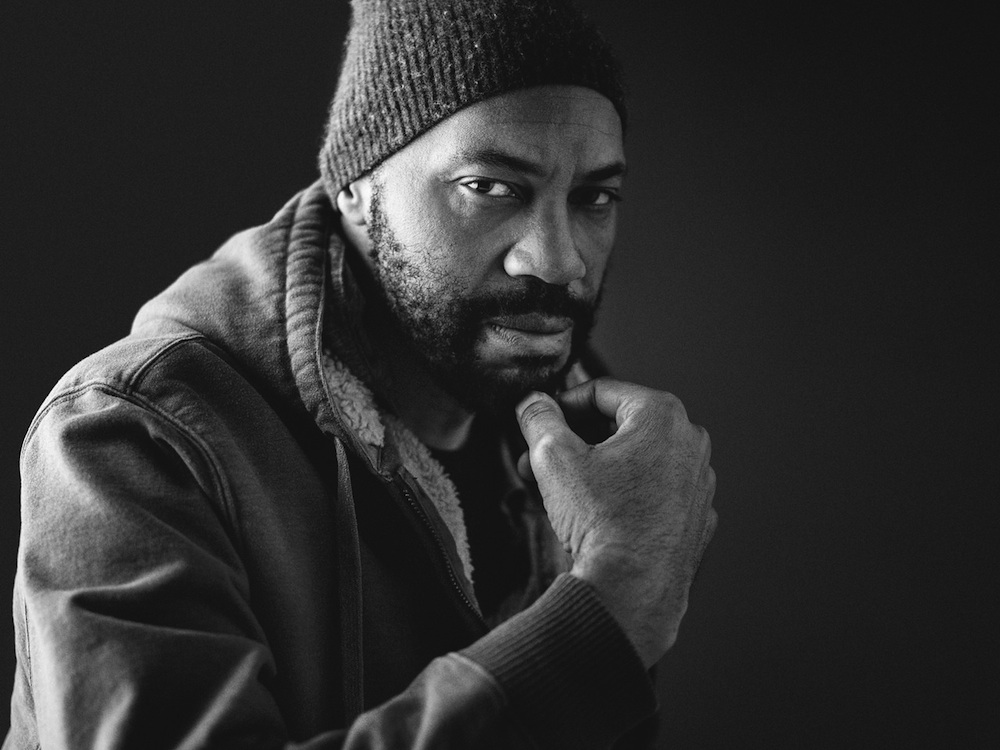
JOHN RIDLEY IN NEW YORK, FEBRUARY 2015. PHOTO BY CHRISTOPHER GABELLO.
On February 14, 2014, John Ridley won his first Oscar—Best Adapted Screenplay—for the film 12 Years a Slave. “All the praise goes to Solomon Northup,” he said at the podium. “Those are his words. That is his life.”
While adapting Solomon Northup’s memoir deeply affected Ridley personally—”I don’t think anyone can read that story if you’re at all human and not be moved,” he tells us—it’s a mistake to think that the 49-year-old’s career began with his Oscar win. Raised in Wisconsin and educated at New York University, Ridley started out working as a stand-up comedian and writing for popular sitcoms like The Fresh Prince of Bel Air and Martin in the early ’90s. In 1997, Oliver Stone turned Ridley’s first novel, Stray Dogs, into the film U-Turn with Sean Penn. Over the next 17-odd years, Ridley published six more novels, three graphic novels, and one stage play, and worked as a screenwriter and producer on films and television series like Three Kings, Red Tails, Third Watch, Barbershop, and The Wanda Sykes Show. In 2013, Ridley made his directorial debut with the Jimi Hendrix biopic Jimi: All Is by My Side starring Outkast’s André Benjamin, Hayley Atwell, and Imogen Poots. The morning after accepting his Academy Award, he flew to Austin to begin working on his television drama American Crime.
In the American Crime‘s debut episode, which premiered last night on ABC, Ridley introduces us to a disparate cast of characters residing in the unremarkable city of Modesto, California. We meet Russ Skokie (Timothy Hutton), a reformed alcoholic, and his estranged ex-wife Barb (Felicity Huffman). Then there’s the Gutierrez family: two teenagers, Jenny and Tony, and their single father Alonzo. Finally, we’re introduced to star-crossed lovers and meth addicts, Aubrey and Carter. Their connecting factor: the murder of the Skokie’s eldest son, a veteran and possible drug dealer. Ridley and ABC’s aim is to create a network series that is topical, consuming, cinematic, and raw. Not, says Ridley, “television with cool remove—something you watch while reading an article on your iPad.” So far, so good.
EMMA BROWN: How did you first conceive of American Crime? Did you start with a particular character?
RIDLEY: Actually, ABC came to me. The subject matter was something they wanted to pursue. They came to me in August of 2013, which was before 12 Years A Slave and All Is By My Side came out, and they wanted to do something that was challenging, that was provocative. They didn’t know exactly what they wanted it to be, but it was a show that was about us and where we are right now. I did not come back with a specific character in mind necessarily, but I did want to make it about people—not about the police, not about the prosecutors, not about the judicial system. [I wanted to make it] about people who were dealing with being on one side or the other of one of the worst phone calls you can get—that your family member or a loved one was accused of a crime or had been a victim of a violent crime—and what it’s like for these people to remain in these circumstances for months and months on end. That’s where I started: What would it be like to be going through this week in and week out, and the toll that it takes on people when they just want resolution to and it doesn’t come quickly? Or when it does come, it might not come the way they were expecting.
BROWN: You’ve done a lot of different things—written screenplays, novels, a graphic novel, worked for NPR. What did you want to be when you were five?
RIDLEY: At an early age, I knew there were a lot of things I couldn’t do. My father was a doctor, and my mother was a teacher. I knew I wasn’t good in numbers, and I knew I wouldn’t work well in overly structured environments. I always loved telling stories —I didn’t always love reading, but I loved telling stories. Over time, it was just finding a space where I was going to have things that I could contribute or I was going to go hungry! I didn’t have the capacity to do anything else. I don’t know when I made that active decision to be a writer or to try to write, but I know I always liked storytelling.
BROWN: Do you think you’re a particularly empathetic person?
RIDLEY: Yeah, I think I’m an overly emotional person. I feel a lot, but I don’t believe that’s unique to me or that’s how I am able to do the things I do. As a writer, as a storyteller, you have to have your emotions close, and the older I’ve gotten, the less I’ve worried about not displaying emotions. When I was young and I look at the things that I wrote—I don’t think that was the word they used back then, but they had a hipster sensibility. They were a little irreverent. When entertainment works the best, you’re creating an apparatus to convey emotions. I don’t think it’s good when entertainment tries to proselytize and I don’t think people ultimately want someone showing up in their living room and just hectoring at them all day long. But if you can create a space where people are caught up in something—whether it’s a drama, a comedy, a romantic comedy, or science fiction—that’s when people give over their minds and allow their emotions to flow. That’s certainly what I hope we’re doing in this space, and to do that I have to be able to read the material and watch the cut and be moved in some regard. I’m not beyond it, and I’m at an age where I don’t worry about it. For me over the last bunch of years—having been around the Tuskegee Airmen, having read Solomon’s memoir, having talked to people like Linda Keith—I worry less about being removed from things or being wholly objective. If this moves me, great. I hope it moves the person who sees it or watches it.
BROWN: I know it’s a bit premature, but so many series now are anthology series. Is that something you’re thinking of doing with American Crime?
RIDLEY: Absolutely—not even notionally. If we’re fortunate enough to come back in the next season, I’d love to have it in a new city, in new circumstances, with a new inciting incident to look at ourselves in a different way. [I want] to keep as much of the cast as possible—it is a phenomenal cast, they were great partners—but to change the look of it, to change the elements of cinema that we’re using. Can we create this comfortable space where people show up to American Crime and have certain expectations about the storytelling or the quality or the performances? And within that, once people come back, how can we challenge them?
BROWN: What made you choose Modesto, California as the setting of the first season? I didn’t know much about it before watching the show, but it seems that it’s a big meth town.
RIDLEY: It is, but the reason I was drawn to Modesto was actually what you said initially: you don’t know much about it. It’s different from setting it in Los Angeles or New York or Chicago or a small town in the South, or even a small town in the East Coast, where just based on the geography, a lot of us come into a situation with a predisposition about that place, about those people. Modesto could represent almost anywhere in America. When you look at what happened in Ferguson—before that, we didn’t know anything about this place, but the name of this place has come to represent something very specific. A lot of us, we still don’t know the complexities of that city, or that region, what those folks are going through. So I wanted a city that wasn’t overly familiar, where one would not necessarily expect a sizeable crime to happen. Quite frankly, in a city like Los Angeles or New York, it would have to be a pretty spectacular [murder] to take the public’s attention.
BROWN: When you’re writing a screenplay, do you read the words out loud to yourself?
RIDLEY: Far too often. My kids will find me walking around the house talking to myself and think I’m going crazy. I like to read the scripts out loud and really get the rhythm for the dialogue. There are other places where I try to take out as much dialogue as possible so there’s more imagining. It’s a lot of walking around, reading it out loud, or talking through the dialogue in my head, trying to work it out. Other times, it’s just sitting quietly and thinking about how somebody is sitting, how somebody is looking at somebody or not looking at somebody—trying to take the time to think of a scene as a scene.
BROWN: Do you find the language of the screenplay seeping in your personal life?
RIDLEY: Sometimes I realize I’m talking a little bit like Russ or like Aubrey. But they tend to be moments where I’m really trying to hyper-realize that character—not just in the words, but how they live, how they see the world, little affectations that they might have.
BROWN: The characters vary pretty widely—different ages, ethnicities, backgrounds. Do you find it as easy to write from the point of view of a Latina teenage girl as someone your own age, gender, and race?
RIDLEY: In some ways, it’s easier to bury yourself in, for example, the Aubrey character, where people are going to figure there’s not much of you—it’s a young white girl who’s on drugs. That, for me, is an interesting opportunity to take things I think we’re feeling and put them in a place that I think people are not expecting to find them—in the characters that are, on the surface, most dissimilar to me. There’s certain elements of language—words or slang—and you want to make sure you have somebody in your working space that is a little bit closer to that sensibility. But there are elements in their emotional character—whether it’s the young white girl or [actress] Regina [King] as a Muslim American—there’s some core value, some guiding principle in there that may be a little bit more me than people expect.
BROWN: David Oyelowo mentioned that you screened Red Tails for President Obama at the White House.
RIDLEY: I actually didn’t get to go to the White House with Red Tails. I have yet to screen a film for our current president. I’m running out of time. At this point, the only reason I have work coming out on an annual basis is that I’ve got two years left to put a film in front of the President. I’m trying as hard as I can. David got to go to the White House. David is one of, if not the most, talented individuals working. He is one of the sweetest guys out there. I was really pulling for him with Selma; I thought he gave a wonderful performance.
BROWN: Are you allowed to talk about Ben-Hur at all? I know you worked on that screenplay as well.
RIDLEY: I can talk about Ben-Hur. I can tell you that it was a very interesting set of circumstances. In 2014, these gentlemen approached me. A gentleman named Keith Clarke had written a script for Ben-Hur, and the initial reaction, I think, from most people and myself included was, “Why would they want to remake Ben-Hur?” And I read the script that Keith wrote and it was phenomenal. It went back to Lew Wallace’s original novel and it’s a real story of two brothers growing up together and the things that make them similar and the things that make them dissimilar. When people think about Ben-Hur, obviously they think of the chariot race—
BROWN: And leprosy. I had recurring nightmares about leprosy as a child because of Ben-Hur.
RIDLEY: It’s pretty chilling. Most people wouldn’t remember the leprosy, or Naomi, or Tirzah, or Messala, or their dynamic in all those elements of the story. Keith went back and really excavated those and made it about two young men who are trying to come to terms with the fact that they’re not really from the same family, but they are brothers and their destinies are intertwined. I was very appreciative of Keith for not shying away from the material. It is an iconic film, but at the same time, I think there are so many things that people don’t remember. As always, there are things in the source material that couldn’t make it in, even with a four-hour production like the 1959 version. I think it was really admirable for Keith to make the attempt. [When they approached me, they said], “We’ve just got to get this thing into training weight. Can you help us and not lose any of the things that Keith had put into the original draft?” I hope and believe that we accomplished that.
BROWN: Is there any story that you would like to revisit or remake in that way?
RIDLEY: In terms of a direct remake, I don’t know. There are probably remakes that I want to take on that didn’t necessarily turn out so well the first time around—the movies you see and you know there’s something there. But if it weren’t for Keith and what he attempted, I don’t know if I would ever think to redo something like Ben-Hur.
BROWN: What about the script you wrote about the 1992 L.A. riots? Is that going to go into production?
RIDLEY: I believe something very special is going to happen with it soon. I can’t speak directly about it. There are a lot of elements of that story that people are not aware of, and to have the opportunity to hopefully one day, not just talk about the complexities that happened in that moment, but to give life to them…Fifty-six people died [during the riots] and there was almost a billion dollars worth of damage. That was in the early ’90s. That’s a story that deserves to be told, if not by me, I certainly hope someone tells that story. People maybe think of Rodney King and Reginald Denny, but they don’t know about Latasha Harlins or the Du family or Operation Hammer that led to that circumstance. I hope that I have an opportunity to tell that story, but what excites me is that, year by year, we are seeing so many different kinds of people telling the stories that they want tell.
AMERICAN CRIME AIRS THURSDAYS ON ABC. BEN-HUR IS DUE OUT IN 2016.

